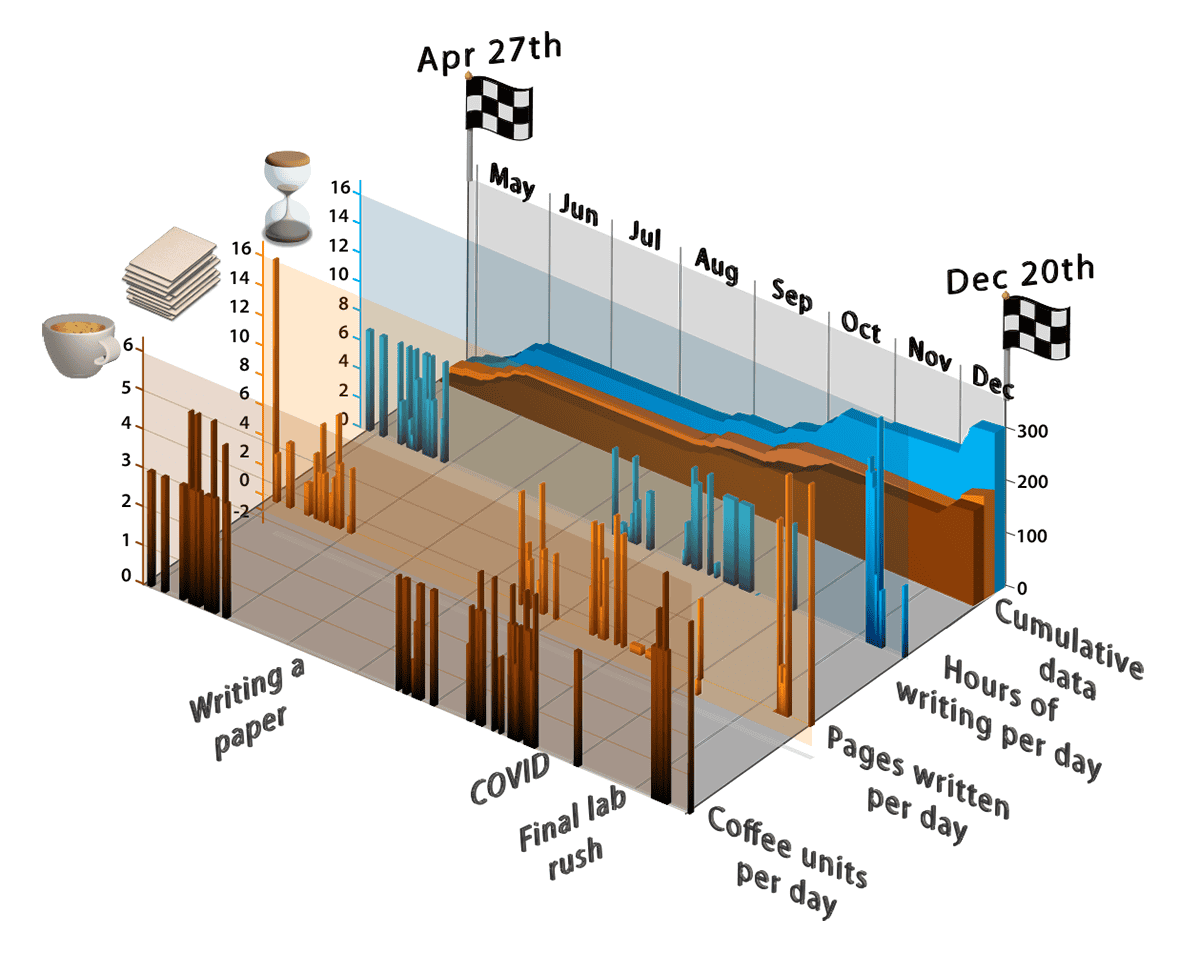When he started writing up his PhD thesis, Vittorio Aita was warned that it would be hard. However, he explains that taking pride in the small things and finding a lighthearted way to track his progress – in cups of espresso – kept him going even when the work was tough

Every PhD student has been warned at least once that doing a PhD is stressful, and that writing a thesis can make you thoroughly fed up, even if you’re working on a topic you’re passionate about.
When I was coming to the end of my PhD, this thought began to haunt me. I was enjoying my research on the interaction between light and plasmonic metamaterials, but I worried that the stress of writing my thesis would spoil it for me. Perhaps guided by this fear, I started logging my writing activity in a spreadsheet. I recorded how many hours per day I spent writing and how many pages and figures I had completed at the end of each day.
The immediate benefit was that the spreadsheet granted me a quick answer when, once a week, my supervisor asked me the deeply feared question: “So, how many pages?” Probably to his great surprise, my first answer was “Nine cups of espresso.”
In Naples, Italy, we have a relationship with coffee that borders on religious
The idea of logging my writing activity probably came from my background as an experimental physicist, but the use of espresso cups as a unit goes back to my roots in Naples, Italy. There, we have a relationship with coffee that borders on religious. And so, in a difficult time, I turned to the divine and found my strength in the consumption of coffee.

As well as tracking my writing, I also recorded the number of cups of espresso I drank each day. The data I gathered, which is summarized in the above graph, turned out to be quite insightful. Let’s get scientific:
I began writing my thesis on 27 April 2023. As shown by the spacing between entries in the following days, I started at a slow pace, dedicating myself to writing for only two days a week and consuming an average of three units of coffee per day. I should add that it was quite easy to “write” 16 pages on the first day because at the start of the process, you get a lot of pages free. Don’t underestimate the joy of realizing you’ve written 16 pages at once, even if those are just the table of contents and other placeholders.
In the second half of May, there was a sudden, two-unit increase in daily coffee consumption, with a corresponding increase in the number of pages written. Clearly by the sixth entry of my log, I was starting to feel like I wasn’t writing enough. This called for more coffee, and my productivity consequently peaked at seven pages in one day. By the end of May, I had already written almost 80 pages.
Readers with an eye for detail will also notice that on the second to last day of May, coffee consumption is not expressed as an integer. To explain this, I must refer again to my Italian background. Although I chose to define the unit of coffee by volume – a unit of espresso is the amount obtained from a reusable capsule, the half-integer value is representative of the importance of the quality of the grind. I had been offered a filtered coffee that my espresso-based cultural heritage could not consider worth a whole unit. Apologies to filter coffee drinkers.
From looking at the graph entries between the end of May and the middle of August, you would be forgiven for thinking that I took a holiday, despite my looming deadline. You would however be wrong. My summer break from the thesis was spent working on a paper.
However, in the last months of work, my slow-paced rhythm was replaced by a full-time commitment to my thesis. Days of intense writing (and figure-making!) were interspersed with final efforts to gather new data in the lab.
In October some photons from the end of the tunnel started to be detectable, but at this point I unfortunately caught COVID-19. As you can tell from the graph, in the last weeks of writing I worked overtime to get back on track. This necessitated a sudden increase in coffee units: having one more unit of coffee each day got me through a week of very long working days, peaking at a single day of 16 hours of work and 6 cups of espresso.
I felt suddenly lighter and I was filled with a deep feeling of fulfilment
I finally submitted my thesis on 20 December, and I did it with one of the most important people in my life at my side: my grandma. I clicked “send” and hugged her for as long as we both could breathe. I felt suddenly lighter and I was filled with a deep feeling of fulfilment. I had totalled 304 hours of writing, 199 pages and an impressive 180 cups of espresso.
With hindsight, this experience taught me that the silly and funny task of logging how much coffee I drank was in fact a powerful tool that stopped me from getting fed up with writing.
More often than not, I would observe the log after a day of what felt like slow progress and realize that I had achieved more than I thought. On other days, when I was disappointed with the number of pages I had written (once even logging a negative number), the amount of coffee I had consumed would remind me of how challenging they had been to complete.
Doing a PhD can be an emotional experience, particularly when writing up the thesis: the self-realization, the pride, the constant need to improve your work, and the desire to convey the spark and pull of curiosity that first motivated you. This must all be done in a way that is both enjoyable to read and sufficiently technical.
All of this can get frustrating, but I hope sharing this will help future students embrace the road to achieving a PhD. Don’t take yourself too seriously and keep looking for the fun in what you do.



